Is Airbnb safe? What you should know before booking
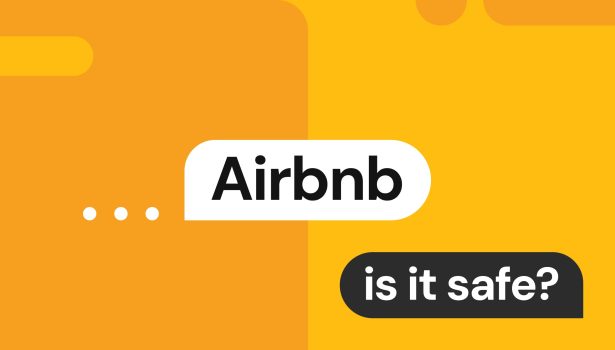
Airbnb is generally safe, that is, when used the right way. Multiple trust and safety features are integrated into the platform to provide secure payments, verified profiles, and reviews from other users. The company has even launched a Trust & Safety Advisory Coalition, partnering with 22 respected organizations like Safe Kids Worldwide and National White Collar Crime Center.
However, like all services that involve peer-to-peer interactions, Airbnb does have certain safety issues–misleading listings and hidden cameras being among the most common. Since the platform itself doesn’t operate any rental properties, the safety of your stay depends on your own research and judgment.
In this guide, we’ll dwell on why Airbnb is safe to use during your travels and recommend measures to guard against potential risks.
Is Airbnb safe for travelers?
Over the years, Airbnb has reached enormous popularity by attracting travelers seeking accommodations beyond traditional hotels at reduced costs. The platform provides a secure experience as long as users book directly through the official channels while respecting recommended guidelines.
Various measures introduced by the company over the years aim to increase the comfort and safety levels of both hosts and potential guests.
Let’s break them down:
Identity verification
Airbnb asks its users to verify their identity with state-issued documents such as identity cards and passports, as well as biometric authentication and other verification methods. The platform also conducts background checks involving national criminal databases and security watchlists in some countries.
The identity verification system operates as a basic protection that helps eliminate dangerous actors at the initial steps of the booking process.
Host and guest reviews
Airbnb’s trust system depends almost entirely on the feedback provided by its users. With every completed stay, both hosts and guests are encouraged to rate each other. Since reviews are gathered from verified users, ratings are real and are difficult to manipulate.
Such a two-directional feedback process helps prevent any scams and poor experiences both for those renting and providing a property.
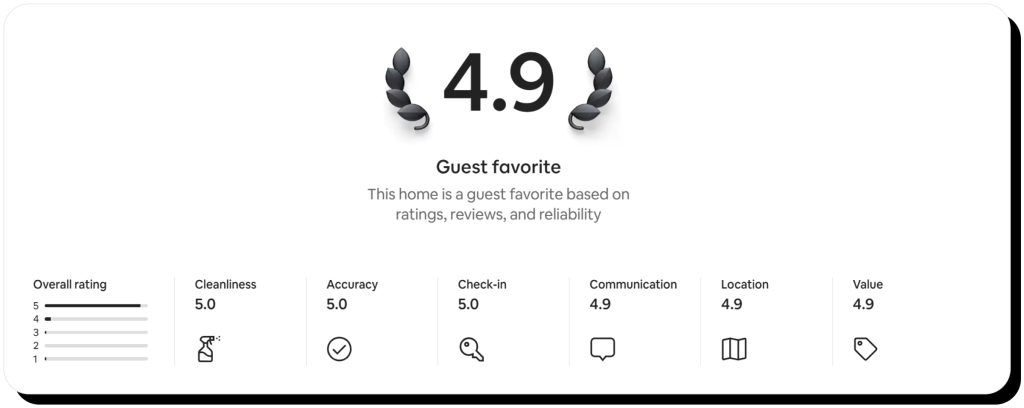
AirCover
Every Airbnb guest receives protection through AirCover as an integral element of the platform. It includes:
- Booking protection guarantee (helps you find another property or get a full refund if a host cancels within 30 days of your check-in date)
- 24-hour safety line
- Check-in guarantee (helps you find another property or get a refund if you can’t access the rental upon arrival)
- Get-what-you-booked guarantee (helps you find another property or get a refund if the rental is materially different from what was listed)
Secure payment system
Even though you pay with your card (or PayPal/ Apple Pay/ etc.), all transactions are processed through Airbnb’s payment system. This ensures that hosts don’t see your card number or other financial details. Additionally, Airbnb withholds the host payment for 24 hours after check-in, so you can report any issues before the funds get released.
Payments outside the platform are strictly prohibited and may result in penalties.
How reliable is Airbnb?
At the time of writing this article, Airbnb has a score of 1.3 on Trustpilot based on 14,694 reviews.
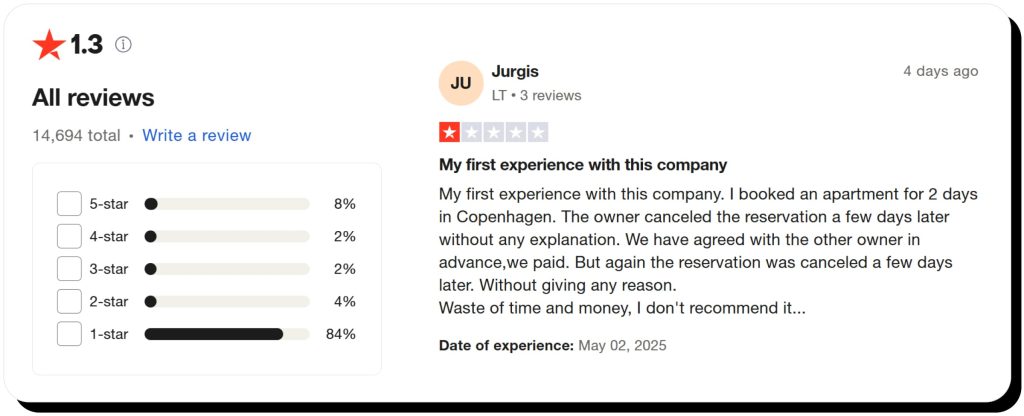
Here are the most common complaints:
- Refund delays: Guests report slow or denied refunds, even for valid claims.
- Rebooking frustrations: Airbnb’s alternatives are often pricier or lower quality, and users may have to cover the cost difference.
- Poor customer support: Help can be slow or unhelpful in some situations.
- Misleading listings: Some users report discrepancies between the property’s description and its actual condition, including outdated photos or missing amenities.
At the same time, Airbnb has a rating of 4.5 stars by 1,698,006 users on Google Play and 4.8 stars by 669,858 users on the Apple App Store.
So, is Airbnb reliable? Seems like the service has some work to do when it comes to its reputation and public opinion. We advise anyone seeking to book through Airbnb to do proper research and have alternative accommodations in mind before fully committing.
Cancellation policies
Airbnb gives hosts the freedom to choose from a set of standardized cancellation policies–flexible, moderate, and strict, each offering different levels of refundability and booking protection for guests. Not all listings offer the same level of flexibility, so it’s crucial to check the policies during your search.
- Flexible: Full refund if canceled at least 24 hours before check-in.
- Moderate: Full refund if canceled at least 5 days before check-in.
- Strict: Partial refund if canceled at least 14 days before check-in, and only 50% up to 7 days before.
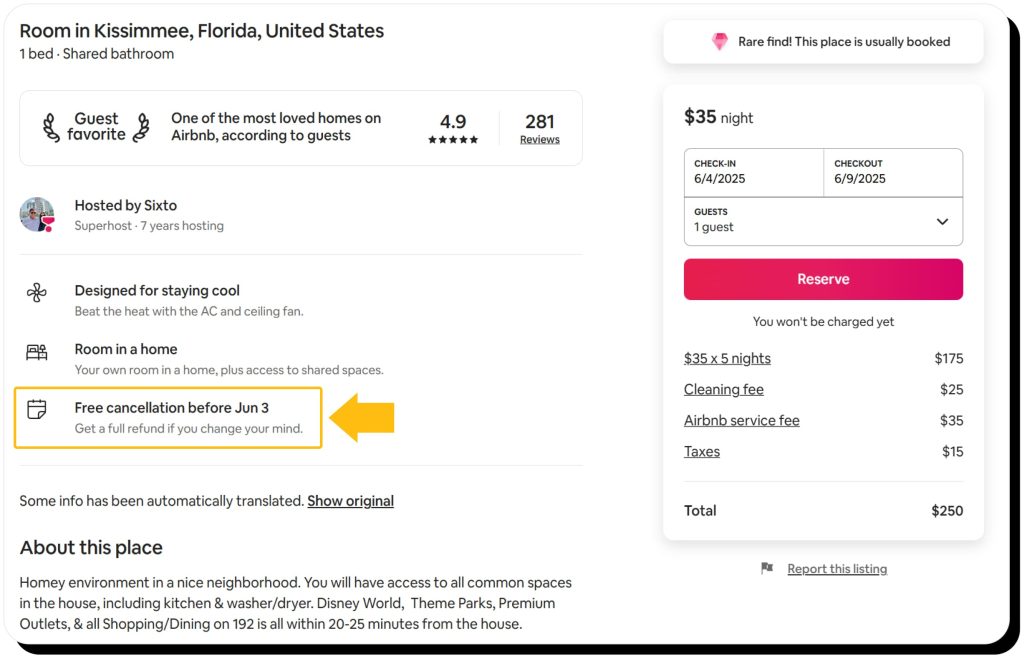
In exceptional situations, like natural disasters, serious illness, or government travel restrictions, Airbnb’s Major Disruptive Events Policy may override the host’s cancellation terms, allowing guests to receive a full refund even under otherwise strict policies.
Host accountability
Airbnb holds hosts accountable for delivering what they promise in their listings. If a host cancels at the last minute, provides false information, or violates Airbnb’s standards, they can face several penalties. Those include financial fees, lower listing visibility, suspension, and even removal from the platform. This system encourages hosts to maintain honest, high-quality listings and uphold guest trust.
Airbnb typically provides assistance to find you different accommodations when hosts cancel near your travel dates and provides you with booking credits in return.
Airbnb’s customer support
Airbnb maintains 24/7 customer support available in multiple languages, together with a designated safety team that should help resolve emergency cases promptly.
Main channels include a self-help FAQs centre, in-app support, phone support (with both local and international numbers), and a live chat.
Common risks and how to avoid them
Even with proper safeguards in place, Airbnb isn’t immune to bad experiences. Here’s what to know about Airbnb scams before booking:
Fake listings or hosts
Even though Airbnb has identity verification in place, scammers still find a way to bypass it and defraud unsuspecting travellers. They exploit stolen images and fake data to generate misleading listings. When you arrive, the property doesn’t match the description or you can’t access it at all.
Traveler tip: Pay attention to pricing that seems beyond reason, and make all reservations through the official Airbnb website. Report any host who asks you to communicate or pay outside of the platform.
Hidden cameras
Airbnb has a strict policy against hidden cameras in private spaces, yet guests discover them inside their rental properties.
When staying at an Airbnb:
- Inspect key hiding areas such as smoke detectors, alarm clocks, and vents immediately after arrival.
- Scan the environment for surveillance devices through both mobile application detection tools and physical scanning equipment.
Cleanliness issues
What looks spotless in photos might not be so in person. While Airbnb does encourage hosts to follow enhanced cleaning protocols, standards vary.
Traveler tip: Read the most recent reviews and look for mentions of hygiene or cleanliness.
Misleading photos
Some listings exaggerate size, lighting, or amenities. While you can’t really catch such tricks before you arrive and see the property, use the review section to check whether the rental matched the expectations of other travelers.
If you come and find the place dramatically different, contact Airbnb support immediately.
Late cancellations or no-shows
Even though Airbnb penalizes hosts who cancel without valid reasons, such incidents still occur. Moreover, some hosts even claim that a guest never arrived to avoid refunding or cancellation penalties.
Traveler tip: To minimize the risk, stick to Superhosts with a strong history of reliability. It’s also a great idea to have a backup in case things go wrong, which can simply be the nearest hostel.
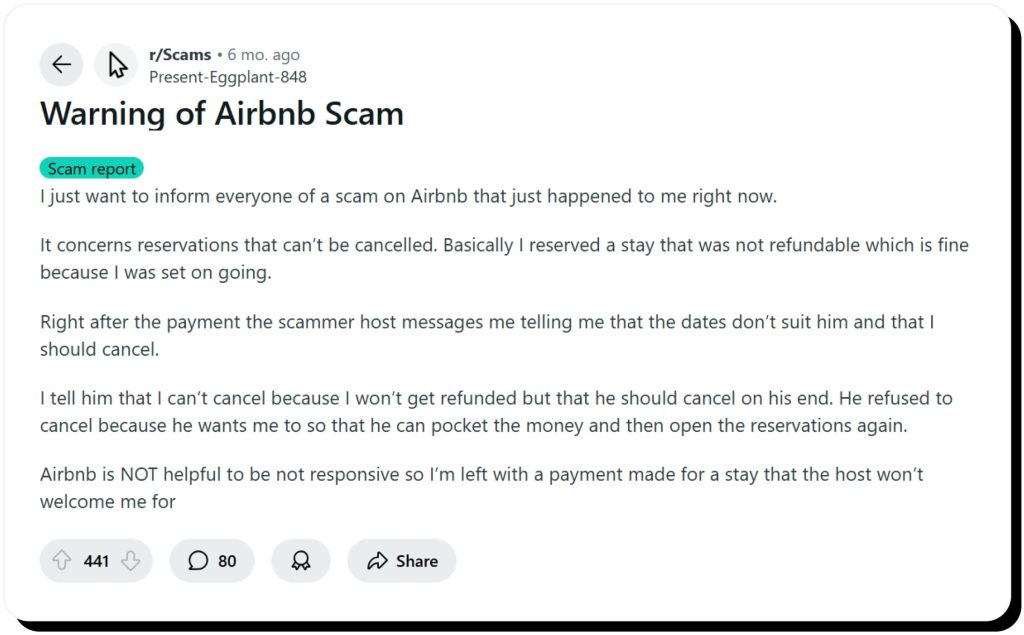
Tips for a safe Airbnb stay
Being proactive in terms of safety is an absolute necessity during travel. When renting an Airbnb, always follow these guidelines:
Check reviews and verified badges
Prioritize listings with 4.5 stars and above and a high number of reviews. Ideally, opt for hosts that are “Verified” or “SuperHosts” with consistent praise. Make sure to read both positive and negative feedback for proper assessment–sometimes other people complain about things that are of little matter to you.
Communicate within the Airbnb app
Everything should take place in the Airbnb ecosystem, including communication and payment. This way, your messages are documented and you are protected in case of disputes.
Inspect the property upon arrival
As soon as you check in:
- Inspect all the locks, exits, and fire alarms.
- Test the Wi-Fi, lights, and basic appliances.
- Examine the furniture for any defects.
If something doesn’t work right or is damaged, take photos and contact the host right away.
Avoid sharing personal information
The host doesn’t need to know much about you other than what’s already provided via Airbnb. They don’t need your financial data and they extremely rarely need your personal contact details.
Never share:
- Credit card numbers
- Social Security numbers
- Work or travel schedules in detail
- Personally identifiable information like your date of birth, legal name, etc.
Read policies attentively
When looking for a rental, make sure that you read every listing attentively to check if:
- You need to clean up after your stay
- There are curfews
- There are any hidden fees
Traveler tip: Always select accommodations that allow flexible or moderate cancellation rules because unexpected schedule changes may occur.
How Onerep can help protect your privacy while traveling
To target you with easy-to-believe scams, fraudsters need to know more about you than your name. One source that can give them access to a variety of your personal details is data brokers.
Data brokers expose your home address, location history, phone number, income range, family ties, properties, bankruptcies, and other sensitive data to anyone interested. This makes you an easy target for phishing, harassment, fraud, and even identity theft.
Onerep protects your personal information by removing it from 232 data broker sites. The service finds the pages where your data is exposed, sends opt-out request on your behalf, and continuously monitors the web for reappearances. This not only improves your privacy but also reduces the risk of scammers creating personalized attacks on you.
Final verdict: is Airbnb safe?
Airbnb is generally safe, but the risk of being scammed or dissatisfied still exists. The platform has implemented numerous safety features, but the final layer of protection is you and your research.
If you stick to verified listings, keep all communication and payment within the Airbnb platform, and stay alert for red flags, then you’re more likely to have a smooth and secure Airbnb experience.
Whether you’re a solo traveler, a digital nomad, or a family on vacation, Airbnb can be a fantastic option, as long as you take the right precautions and are proactive to ensure your own safety in case something goes wrong.
FAQs
Is Airbnb safe for solo travelers?
Yes, but solo travelers should take extra precautions. Book Superhost listings with strong reviews, share your itinerary with someone you trust, and avoid isolated properties if you’re unfamiliar with the area.
What should I do if I feel unsafe at my Airbnb?
Contact Airbnb’s 24/7 support immediately. If it’s an emergency, call local authorities.
How do I check if an Airbnb listing is legit?
Look for listings with verified badges, detailed host profiles, and a high number of positive reviews. Avoid properties that seem unusually cheap or lack reviews.
Is it better to stay at an Airbnb or a hotel for security?
Hotels generally offer more consistent security, e.g., 24/7 front desk staff and security cameras, but Airbnb can still be a safe option if you choose wisely. Avoid remote locations, unusually cheap properties, and listings without reviews, and do your research on the neighborhood before booking.
Can I get scammed on Airbnb?
Yes, scams are possible, though rare if you use the platform correctly. Common scams include fake listings, off-platform payment requests, or hosts misrepresenting the property. To avoid getting scammed, never pay outside Airbnb, verify listings, read reviews, and report any suspicious behavior immediately.


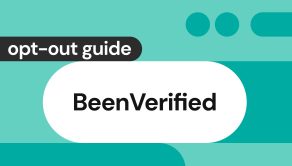
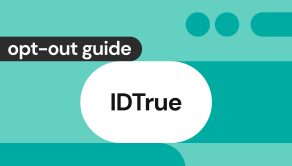

Mark comes from a strong background in the identity theft protection and consumer credit world, having spent 4 years at Experian, including working on FreeCreditReport and ProtectMyID. He is frequently featured on various media outlets, including MarketWatch, Yahoo News, WTVC, CBS News, and others.